Try and imagine businesses operating without data. Then try to imagine how much productivity levels could improve if employees were given self-service data strategies. A new study from Forrester Consulting and Capital One Software finds that a majority of data decision-makers face key technical and internal cultural challenges that inhibit the successful deployment of self-service data strategies. One challenge is there is no team alignment or incentive to use or manage data.
Self-service data strategies are the ability to “allow technical and nontechnical professionals to leverage data faster without a central tech team” to get their jobs done, according to the report.
As one example, this could mean “enabling data consumers to find and access relevant data to generate new insights without having to go through a central engineering organization,” Patrick Barch, senior director of product management at Capital One, told TechRepublic in an email interview. “It could also mean enabling application engineering teams to share data with other business units without having to go through a central engineering organization.”
For self-service data strategies to succeed, “business leaders need to enable all teams, from data scientists to business users, to get value out of data regardless of their skill sets,” the report noted.
Jump to:
Top challenges with self-service data strategies
Top challenges cited in the study include maintaining user-friendly environments (49%), increasing data trust and quality (49%) and scaling self-service for decentralized environments (47%).
Further, while data decision-makers view self-service data strategies as critical to business success, over 50% are experiencing difficulties figuring out where to begin, according to the study.
One problem is people’s mindsets. Over half (52%) of respondents said they are having trouble developing or adapting training for self-service data workflows. Nearly half of respondents are unwilling to engage in new self-service workflows (47%), the study found.
No team alignment and incentives to use/manage data
Businesses can realize significant value from their data when there is a more inclusive data culture that utilizes user-friendly technology and workflows to meet talent where they are, the study said.
Yet, organizations have a lot of work ahead of them to make this happen. Barch said it was surprising to see the discrepancy between the number of respondents who said self-service data strategies must enable all teams to get value out of their data versus the number of respondents who are actually deploying self-service data strategies across all teams.
“The study cites that eight out of ten respondents agreed that they must enable all teams to get value out of their data — not just more technical data teams,” he noted. “However, when asked about the roles that self-service data strategies currently support, it’s clear that most of the focus is on data roles.”
The research found that less than one-quarter of respondents’ companies are supporting people in business-focused roles (Figure A) such as business stakeholders or senior business executives, Barch said.
Figure A

“This points to a potential lack of alignment and incentive across the teams that leverage and manage data, as well as the technical and cultural challenges that may hinder respondents’ organizations from actually adopting self-service strategies that support all teams,” he said.
Data governance is lacking in self-service data strategies
Data decision-makers also said that applying the appropriate data governance for self-service strategies is a top concern. Only 35% of respondents strongly agreed that they’re able to apply and comply with changing and evolving regulations.
The research found that it’s difficult for respondents to apply and comply with changing and evolving regulations, yet less than 25% of respondents indicated that their self-service data strategies support data governance managers, Barch noted.
“Enabling self-service and implementing data governance can often feel contradictory,” he pointed out. “Enabling self-service is all about making processes easier, whereas governance can add complication. The key is to embed data governance into self-service workflows.”
Proving ROI for self-service data strategies is difficult
The study also found that data executives are struggling to fund self-service data strategies and prove ROI. While 86% of respondents reported seeing a connection between self-service data strategies and business success, over half (51%) cited challenges proving it in order to secure funding.
The study cites high upfront costs as the reason because they eclipse the potential for cost savings down the road.
Self-service strategies must focus on technical and cultural goals
This is also hindering the ability to use data cross-functionally, since most self-service strategies are mainly supporting data roles within organizations, according to the report. For self-service data strategies to succeed, 75% of data decision-makers believe their firm’s culture must evolve to be more collaborative, the study said.
Significantly, 81% of data decision-makers believe that for their business to succeed, self-service strategies must enable all teams, including non-technical roles, to get business value out of their data.
Despite these challenges, an overwhelming majority of data leaders (86%) said self-service data strategies are critical to business success.
SEE: TechRepublic Premium’s Big Data Quick Glossary
Respondents said their top goals for implementing a self-service strategy include building trust in data sources (83%), increasing the use of data across the business (83%) and increasing the understanding of data meaning across the business (80%).
One step is to seek funding for self-service technology and workflows as part of the broader initiative being funded versus on its own, Barch recommended.
But culture must also be addressed. “Organizations need to focus on building the right organizational culture in order to adopt self-service initiatives, not just investing in the right technology,” he added. “There is a distinct connection between the cultural and technical challenges that organizations face when adopting self-service data strategies.”
Data leaders need to implement self-service data strategies with both technical and cultural goals in mind, Barch stressed. “Focus on fostering an inclusive data culture and building scalable, user-friendly technology and workflows with embedded governance that empower data users to get their jobs done quickly and confidently.”
Additionally, organizations need to treat their internal data practitioners with the same care as they would external customers – and leaders must try to understand their internal customers’ motivations and challenges, he said.
“And, as leaders look for self-service tooling to support data use cases, they should consider how to confront the cultural shifts that might need to occur in order to operationalize the use cases that the tools are intended to solve,” Barch said.
Study methodology
The study was commissioned by Capital One Software and Forrester surveyed 150 data science, analytics and cloud infrastructure and data decision-makers at North American companies. The survey was conducted between May and June 2023.
Source of Article



